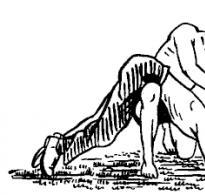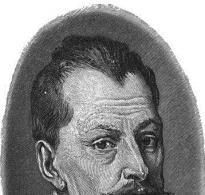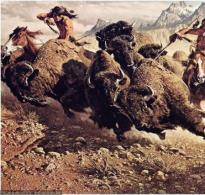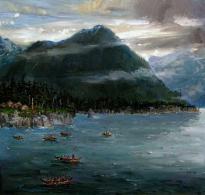Otto von Bismarck is famous for what. Otto von Bismarck - biography, information, personal life. Creation of the North German Confederation
At the age of 17, Bismarck entered the University of Göttingen, where he studied law. When he was a student, he gained a reputation as a reveler and a fighter, and excelled in duels. In 1835 he received a diploma and was soon enlisted to work at the Berlin Municipal Court. In 1837 he took the post of tax official in Aachen, a year later - the same position in Potsdam. There he joined the Guards Jaeger Regiment. In the autumn of 1838, Bismarck moved to Greifswald, where, in addition to performing his military duties, he studied animal breeding methods at the Elden Academy. His father's financial loss, together with an innate distaste for the lifestyle of a Prussian official, forced him to leave the service in 1839 and take over the management of the family estates in Pomerania. Bismarck continued his education, taking up the works of Hegel, Kant, Spinoza, D. Strauss and Feuerbach. In addition, he traveled throughout England and France. Later he joined the Pietists.
After the death of his father in 1845, the family property was divided and Bismarck received the estates of Schönhausen and Kniephof in Pomerania. In 1847 he married Johanna von Puttkamer. Among his new friends in Pomerania were Ernst Leopold von Gerlach and his brother, who not only were at the head of the Pomeranian pietists, but were also part of a group of court advisers. Bismarck, a pupil of the Gerlachs, became known for his conservative stance during the constitutional struggle in Prussia in 1848-1850. Opposing liberals, Bismarck promoted the creation of various political organizations and newspapers, including the "New Prussian newspaper" ("Neue Preussische Zeitung"). He was a member of the lower house of the Prussian Parliament in 1849 and of the Erfurt Parliament in 1850, when he spoke out against a federation of German states (with or without Austria), because he believed that this union would strengthen the revolutionary movement that was gaining strength. In his Olmutz speech, Bismarck defended King Frederick William IV, who capitulated to Austria and Russia. The satisfied monarch wrote of Bismarck: “An ardent reactionary. Use later."
In May 1851, the king appointed Bismarck the representative of Prussia in the allied diet in Frankfurt am Main. There, Bismarck almost immediately concluded that Prussia's goal could not be a German confederation under Austrian dominance, and that war with Austria was inevitable if Prussia were to dominate a united Germany. As Bismarck improved in the study of diplomacy and the art of government, he increasingly moved away from the views of the king and his camarilla. For his part, the king began to lose confidence in Bismarck. In 1859, the king's brother Wilhelm, who was then regent, relieved Bismarck of his duties and sent him as an envoy to St. Petersburg. There, Bismarck became close to the Russian Minister of Foreign Affairs, Prince A. M. Gorchakov, who assisted Bismarck in his efforts to diplomatically isolate first Austria and then France.
Minister-President of Prussia.
In 1862 Bismarck was sent as an envoy to France at the court of Napoleon III. He was soon recalled by King William I to resolve the contradictions on the issue of military appropriations, which was vigorously discussed in the lower house of parliament. In September of the same year, he became the head of government, and a little later - the minister-president and minister of foreign affairs of Prussia. A militant conservative, Bismarck announced to the liberal middle-class majority in parliament that the government would continue to collect taxes in accordance with the old budget, because parliament, due to internal contradictions, would not be able to pass the new budget. (This policy continued in 1863-1866, which enabled Bismarck to carry out military reform.) At a meeting of the parliamentary committee on September 29, Bismarck emphasized: “The great questions of the time will not be decided by speeches and majority resolutions - this was a blunder of 1848 and 1949 - but by iron and blood." Since the upper and lower houses of parliament were unable to develop a unified strategy on the issue of national defense, the government, according to Bismarck, should take the initiative and force parliament to agree to its decisions. By limiting the activities of the press, Bismarck took serious measures to suppress the opposition.
For their part, the liberals sharply criticized Bismarck for offering to support the Russian Emperor Alexander II in suppressing the Polish uprising of 1863–1864 (the Alvensleben convention of 1863). Over the next decade, Bismarck's policy led to three wars, the result of which was the unification of the German states in the North German Confederation in 1867: the war with Denmark (the Danish war of 1864), Austria (the Austro-Prussian war of 1866) and France (the Franco-Prussian war of 1870). –1871). On April 9, 1866, the day after Bismarck signed a secret agreement on a military alliance with Italy in the event of an attack on Austria, he submitted to the Bundestag his draft of a German parliament and universal secret suffrage for the country's male population. After the decisive Battle of Kötiggrätz (Sadova), Bismarck managed to get the annexationist claims of Wilhelm I and the Prussian generals to be abandoned and offered an honorable peace to Austria (Prague Peace of 1866). In Berlin, Bismarck introduced a bill to Parliament exempting him from liability for unconstitutional acts, which was approved by the Liberals. In the next three years, Bismarck's secret diplomacy was directed against France. The publication in the press of the Ems Dispatch of 1870 (as edited by Bismarck) caused such indignation in France that on July 19, 1870, war was declared, which Bismarck actually won by diplomatic means even before it began.
Chancellor of the German Empire.
In 1871, at Versailles, Wilhelm I inscribed on an envelope an address to the "Chancellor of the German Empire", thus confirming Bismarck's right to rule the empire that he created and which was proclaimed on January 18 in the mirror hall of Versailles. The "Iron Chancellor", representing the interests of the minority and absolute power, ruled this empire in 1871-1890, relying on the consent of the Reichstag, where from 1866 to 1878 he was supported by the National Liberal Party. Bismarck reformed German law, administration and finance. The education reforms he carried out in 1873 led to a conflict with the Roman Catholic Church, but the main cause of the conflict was the growing distrust of German Catholics (who accounted for about a third of the country's population) in Protestant Prussia. When these contradictions emerged in the activities of the Catholic Center party in the Reichstag in the early 1870s, Bismarck was forced to take action. The struggle against the dominance of the Catholic Church was called "Kulturkampf" (Kulturkampf, struggle for culture). During it, many bishops and priests were arrested, hundreds of dioceses were left without leaders. Now church appointments had to be coordinated with the state; clerics could not be in the service of the state apparatus.
In the field of foreign policy, Bismarck made every effort to consolidate the gains of the Frankfurt Peace of 1871, contributed to the diplomatic isolation of the French Republic, and sought to prevent the formation of any coalition that threatened German hegemony. He chose not to participate in the discussion of claims to the weakened Ottoman Empire. When at the Berlin Congress of 1878, under the chairmanship of Bismarck, the next phase of the discussion of the "Eastern Question" ended, he played the role of "honest broker" in the dispute between the rival parties. The secret treaty with Russia in 1887 - the "treaty of reinsurance" - showed Bismarck's ability to act behind the backs of his allies, Austria and Italy, to maintain the status quo in the Balkans and the Middle East.
Until 1884, Bismarck did not give clear definitions of the course of colonial policy, mainly because of friendly relations with England. Other reasons were the desire to preserve Germany's capital and keep government spending to a minimum. Bismarck's first expansionist plans provoked vigorous protests from all parties - Catholics, statesmen, socialists and even representatives of his own class - the Junkers. Despite this, under Bismarck, Germany began to turn into a colonial empire.
In 1879, Bismarck broke with the liberals and subsequently relied on a coalition of large landowners, industrialists, and senior military and government officials. He gradually moved from the Kulturkampf policy to the persecution of socialists. The constructive side of his negative prohibitive position was the introduction of a system of state insurance for sickness (1883), in case of injury (1884) and old-age pensions (1889). However, these measures failed to isolate the German workers from the Social Democratic Party, although they diverted them from the revolutionary methods of solving social problems. At the same time, Bismarck opposed any legislation regulating the working conditions of workers.
Conflict with Wilhelm II.
With the accession to the throne of Wilhelm II in 1888, Bismarck lost control of the government. Under Wilhelm I and Frederick III, who ruled for less than six months, Bismarck's position could not be shaken by any of the opposition groups. The self-confident and ambitious Kaiser refused to play a secondary role, and his strained relationship with the Reich Chancellor became increasingly strained. Differences manifested themselves most seriously on the issue of amending the Exceptional Law against Socialists (in force in 1878-1890) and on the issue of the right of ministers subordinate to the chancellor to a personal audience with the emperor. Wilhelm II hinted to Bismarck about the desirability of his resignation and received a letter of resignation from Bismarck on March 18, 1890. The resignation was accepted two days later, Bismarck received the title of Duke of Lauenburg, he was also awarded the rank of Colonel General of the cavalry.
Bismarck's removal to Friedrichsruhe was not the end of his interest in political life. He was especially eloquent in his criticism of the newly appointed Chancellor and Minister-President Count Leo von Caprivi. In 1891, Bismarck was elected to the Reichstag from Hanover, but never took his seat there, and two years later refused to run for re-election. In 1894, the emperor and the already aging Bismarck met again in Berlin - at the suggestion of Clovis Hohenlohe, Prince of Schillingfurst, Caprivi's successor. In 1895, all of Germany celebrated the 80th anniversary of the Iron Chancellor. Bismarck died in Friedrichsruhe on July 30, 1898.
Bismarck's literary monument is his Thoughts and memories (Gedanken and Erinnerungen), a Big politics of European cabinets (Die grosse Politik der europaischen Kabinette, 1871-1914, 1924-1928) in 47 volumes serves as a monument to his diplomatic skills.
Otto von Bismarck is the first chancellor of Germany who united Germany along the Little German path. He has numerous awards and titles, including the title of Duke of Lauenburg.
The personality and deeds of Otto von Bismarck have been heatedly debated by politicians and historians over the past century. Attitudes towards him changed quite often, literally with every change in the historical era. There is a version that the assessment of his role in the history of Germany underwent changes as many as six times, so that different generations of German schoolchildren received different information about him. He was called the "iron chancellor", his expressions were often quoted, sometimes even attributing things that he never said. The role of Bismarck in uniting the peoples of Germany into one state can hardly be overestimated.
Childhood
The future famous politician was born on April 1, 1815 in the small town of Schönhausen in the province of Brandenburg. The full name of the boy sounded like Otto Eduard Leopold von Bismarck, his parents are the small estate noblemen Ferdinand von Bismarck and Wilhelmina Mencken. Otto was more attracted to his father, but he paid little attention to the children, as he was in military service. He retired as a cavalry captain. Mom, on the contrary, spent all her time with the children, but did not show much love for them.
At the time of Otto's birth, three children were already growing up in the family, but they died as babies. When the boy was one year old, the family changed their place of residence and settled in Pomerania. In the city of Konarzhevo, Otto's father inherited an estate from his cousin, and it was there that the future chancellor of the country spent his childhood. Two more children were born there - Bernard and Malvina.
Seven-year-old Otto began his studies at an elite boarding school in the city of Berlin. Then he entered the gymnasium in Graue Kloster, after which, in 1832, he became a student at the University of Göttingen in Hannover. The young man studied at the law faculty of this university, but after the first year of study he returned back to Berlin. In addition to the main subjects, Otto was very attracted to diplomacy.
The young man began his working biography with administrative work, then he was admitted to the Potsdam Court of Appeal. But he soon got bored of the regularity and monotony of his activities, by nature Bismarck was very active and ambitious. This discipline bored him. In his student years, he developed a reputation as a quick-tempered and extraordinary person, he could afford any mischief, up to duels, from which he always emerged victorious.
Career and military service
In 1837, Otto volunteered for the Greifswald Battalion. In 1839, his mother died, and Bismarck, along with his younger brother, took over the management of the family estates. At that time, he was barely 24.
The young man managed to demonstrate such literacy and prudence, which no one expected from him. He was characterized as a thrifty, prudent, but very hot-tempered owner of the estate. In 1846, he took a job in an office, his duties included supervising the work of dams. He often went on trips to European countries, at which time his own view of politics begins to form.

In those years, he increasingly thinks about a career as a politician, but he did not succeed in moving quickly in this direction. Many acquaintances remembered him for his dubious reputation and explosive character. Only in 1847 did he manage to take a deputy chair in the United Landtag of the Kingdom of Prussia, and this was the beginning of his meteoric career. In those years, numerous revolutions broke out in Europe.
Many liberal and socialist parties tried to defend their rights guaranteed by the constitution. Bismarck adhered to conservative principles, so his appearance in the state system was quite unexpected.
Supporters of the king of Prussia admired von Bismarck's oratorical skills, they were impressed by his views. Having risen to defend the rights of the monarchy, the politician fell into opposition.
Von Bismarck took up the formation of the conservative party and took an active part in founding the Kreuzzeitung newspaper. In parliament, he became a representative of the young nobility, and he perfectly understood that there could be no question of any compromise. He became a supporter of a single parliament and its complete subordination to power.
In 1850, von Bismarck entered the parliament of Erfurt, opposed actions that could lead to conflict with Austria. Otto was able to foresee the defeat that awaited Prussia. He was known as a shrewd politician, and thanks to this he occupies a ministerial chair in the Bundestag of the city of Frankfurt am Main. The lack of experience and diplomatic skills did not prevent Otto from soon becoming famous throughout the country.
In 1857, von Bismarck received a new appointment, now he represented Prussia in Russia. He held this position for five years, until 1862. He visited Russia quite often, visited St. Petersburg many times, where Vice-Chancellor Alexander Gorchakov soon turned out to be among his close friends. Otto learned a lot from Alexander, saw in him a "godfather" in the political field, and even began to adhere to his diplomatic style. Soon the German was fluent in Russian, got acquainted with the mentality and character of the Russian people.
Once von Bismarck uttered his famous statement in which he emphasized that a war between Germany and Russia was unacceptable, because for the German side it would have disastrous consequences. Otto managed to get so close to the Russian monarchs that he was offered a profitable position at court.
The political biography of von Bismarck developed quite successfully, but it flourished during the reign of Wilhelm I, who came to power in 1861. The confrontation between the king and the Landtag led to a constitutional crisis in Prussia. The parties to the conflict could not reach a consensus on the issue of the military budget. Wilhelm needed strong support, and he saw it in the person of von Bismarck, who in those years worked as ambassador to France.
Politics
The differences between the liberals and Wilhelm led to the fact that Otto von Bismarck began to gain weight as an important political figure. He received the post of prime minister and the chair of the minister of foreign affairs, was engaged in the reorganization of the army. The reform did not find support from the opposition, which did not like the ultra-conservative policies of von Bismarck. The confrontation of the opponents subsided for three years, due to the uprisings that arose in Poland. Otto supported the Polish king, and this caused dissatisfaction with his actions in Europe, but Russia trusted him completely and unconditionally.






Soon similar conflicts broke out in Denmark, and Otto was directly involved in their resolution. He again resisted the national movement. In 1866, Prussia began a war with Austria and the division of state lands. Italy fought on the side of Prussia. After the victory, Otto's political positions were noticeably strengthened, Austria was no longer a threat.
In 1867, von Bismarck was directly involved in organizing the North German Confederation. Confederation contributed to the unification of duchies, principalities and kingdoms. Now Otto von Bismarck, the first Chancellor of Germany and the initiator of the introduction of the Reichstag suffrage, all power was concentrated in his hands. In his jurisdiction was the foreign policy of Germany and the internal situation in the country, he was aware of everything that was happening in the state departments.
At that time, France was ruled by Napoleon III, who really did not like the unification of states. He decided to stop this process by military means. The Franco-Prussian war was won by von Bismarck, the French emperor was captured. In 1871, the German Empire arose, the Second Reich, ruled by Kaiser Wilhelm I.
From that time on, von Bismarck had to contain the external threats coming from Austria and France, as well as the internal conflicts that the Social Democrats threatened. All of them were afraid of the power of the created state. Otto was nicknamed the Iron Chancellor, and his foreign policy was called none other than Bismarck's system of alliances. He kept a close eye on the fact that the European countries did not unite in a coalition against Germany, in order to provoke a war. He agreed to any conditions if it promised benefits in the foreign and domestic policy of the country.
The German elite could not decipher von Bismarck's "multi-move" in any way, so he greatly irritated the nobles, who advocated a war, if only to achieve a redistribution of land. The statesman did not accept the colonial policy, although already in those days Germany acquired the first subordinate lands in the Pacific Ocean and Africa.
But the new generation of statesmen needed power, they were not interested in the unity of Germany, they wanted to get world domination. 1888 went down in the history of the country as "the year of the three emperors". That year, Wilhelm I and his son Frederick III died - his father died of old age, his son from oncology (suffered from throat cancer). After their death, Wilhelm II began to rule the country, who tied Germany into the First World War, which turned out to be fatal for the country.
In 1890, Otto turned 75, he wrote a letter of resignation. At the beginning of the summer, Russia, France and England joined forces against Germany.
Personal life
Otto met his wife Joanna von Puttkamer in 1844, when their family lived in Konarzewo. The young man fell in love and soon realized that this was his destiny. The lovers got married in 1847, Otto was immensely happy. The wife became a real support and support for von Bismarck, and he, in turn, tried not to disappoint her. Although at that time he began an affair on the side. The subject of passion was the wife of the Russian ambassador, Ekaterina Orlova-Trubetskaya.

The personal life of the Chancellor has developed well. His wife bore him three children - Mary, Herbert and William. Their family idyll continued until the death of Joanne, who died at the age of 70. Otto was very upset by her departure, he built a chapel where the ashes of his beloved were interred. Then the remains of Joanne were reburied in the mausoleum of the city of Friedrichsruhe, where von Bismarck himself found the last shelter.
The politician was a very versatile person. He was fond of horse riding and collecting thermometers. Frequent visits to Russia led to the fact that he fell in love with the Russian language, knew it almost perfectly. He liked to repeat the word "nothing", meaning "nothing to worry about." Most often, this word was found in memoirs and books about Russia.
Death
In the last years of his life, the politician did not need anything. The rulers of Germany understood what contribution he made to the development of the country. In 1871, he became the owner of land in the duchy of Lauenburg, and in honor of his 70th birthday, he was awarded a large sum of money. With these funds, he bought the estates of his ancestors, bought a manor in Pomerania, and used it as a country residence. The remaining amount was used to create a fund for helping students.

After retiring, the politician became the Duke of Lauenburg, this non-heritable title was granted to him by the government of the country. He never once used it for personal purposes. Von Bismarck moved near Hamburg, wrote articles for periodicals in which he criticized the political system in Germany.
Otto von Bismarck died on July 30, 1898. At that time he was 85 years old and died of natural causes. The place of his burial was the mausoleum in Friedrichsruhe.



Monuments to Otto von Bismarck
During World War II, von Bismarck's name was used for propaganda purposes. Many German politicians cited his book The Great Politics of European Cabinets, which is the literary legacy of the great politician, as well as his second work, Thoughts and Memories.
Links
The relevance and reliability of information is important to us. If you find an error or inaccuracy, please let us know. Highlight the error and press keyboard shortcut Ctrl+Enter .
Otto Eduard Leopold von Bismarck-Schönhausen(German Otto Eduard Leopold von Bismarck-Schönhausen , prince since 1871) - the first chancellor of the German Empire, who carried out the plan for the unification of Germany along the Little German path and was nicknamed the "Iron Chancellor". Upon retirement, he received the title of Duke of Lauenburg and the rank of Prussian Colonel General with the rank of Field Marshal.
As Reich Chancellor and Prussian Minister-President, he had a significant influence on the politics of the created Reich until his resignation in the city. In foreign policy, Bismarck adhered to the principle of the balance of power (or European balance, see below). Bismarck's system of alliances)
In domestic politics, the time of his reign from 1999 can be divided into two phases. He first formed an alliance with moderate liberals. Numerous internal reforms took place during this period, such as the introduction of civil marriage, which was used by Bismarck to weaken the influence of the Catholic Church (see below). Kulturkampf). Beginning in the late 1870s, Bismarck separated from the liberals. During this phase, he resorts to a policy of protectionism and state intervention in the economy. In the 1880s, the anti-socialist law was introduced. Disagreements with the then Kaiser Wilhelm II led to Bismarck's resignation.
In later years, Bismarck played a prominent political role, criticizing his successors. Thanks to the popularity of his memoirs, Bismarck managed to influence the formation of his own image in the public mind for a long time.
By the middle of the 20th century, an unconditionally positive assessment of the role of Bismarck as a politician responsible for the unification of the German principalities into a single national state dominated in German historical literature, which partially satisfied national interests. After his death, numerous monuments were erected in his honor as a symbol of strong personal power. He created a new nation and implemented progressive welfare systems. Bismarck, being loyal to the Kaiser, reinforced the state with a strong, well-trained bureaucracy. After the Second World War, critical voices became louder, accusing Bismarck, in particular, of curtailing democracy in Germany. More attention was paid to the shortcomings of his policies, and the activities were considered in the current context.
Otto von Bismarck. The man who united Germany with the help of three bloody wars, which had previously consisted of more than thirty petty kingdoms, duchies and principalities. A convinced monarchist, in fact, he single-handedly ruled the country for 20 years and was dismissed by the young emperor, who did not want to be in his shadow. Idol of Adolf Hitler.
His name alone brings to mind the image of a tough, burly, gray-haired chancellor with a military bearing and a steely gleam in his eyes. However, Bismarck was sometimes quite different from this image. He was often overwhelmed by the passions and experiences characteristic of ordinary people. We offer several episodes from his life in which Bismarck's character is revealed in the best possible way.
Gymnasium student
"The strong is always right."
Otto Eduard Leopold von Bismarck-Schönhausen was born on April 1, 1815 in the family of a Prussian landowner. When little Otto was 6 years old, his mother sent him to Berlin to the Plaman school, where the children of aristocratic families were brought up.
At the age of 17, Bismarck entered the University of Gottingham. Tall, red-haired Otto does not go into his pocket for a word and, in the heat of disputes with his opponents, fiercely defends monarchist views, although at that time liberal views were in vogue among young people. As a result, a month after admission, his first duel happens, in which Bismarck earned his scar on his cheek. After 30 years, Bismarck will not forget this incident and will say that the enemy then acted dishonestly, hitting surreptitiously.
Over the next nine months, Otto had 24 more duels, of which he invariably came out victorious, gaining the respect of fellow students and receiving 18 days in a guardhouse for a malicious violation of the rules of decency (including public drunkenness).
Official
Surprisingly, Bismarck did not even consider the option of a military career, although his older brother went that route. Having chosen the position of an official in the Berlin Court of Appeal, he quickly hated writing endless protocols and asked for a transfer to an administrative position. And for this, he brilliantly passed the rigorous examination.
However, having fallen in love with the daughter of an English parish priest, Isabella Lorraine-Smith, he becomes engaged to her and simply stops coming to the service. Then he declares: “My pride requires me to command, and not to execute other people's orders!” In the end, he decides to return to the family estate.
Mad landowner
"Stupidity is a gift from God,
but they should not be abused.
In his early years, Bismarck did not think about politics and indulged in all sorts of vices on his estate. He drank without measure, reveled, lost significant sums in cards, changed ladies and did not disregard peasant daughters. A bully and a rake, Bismarck brought his neighbors to a white heat with wild antics. He woke up his friends by shooting at the ceiling so that the plaster fell on them. Rushed through foreign lands on his huge horse. Fired at targets. In the area where he lived, there was a saying; “No, not enough yet, says Bismarck!”, And the future Reich Chancellor himself was called there only as “wild Bismarck.” The bubbling energy required a larger scale than the life of a landowner. The stormy revolutionary moods of Germany in 1848-1849 played into his hands. Bismarck joined the Conservative Party that was being formed in Prussia, launching his dizzying political career.
The beginning of the way
"Politics is the art of adapting
circumstances and benefit
from everything, even from what disgusts.
Already in his first public speech in May 1847 in the United Diet, where he was present as a reserve deputy, Bismarck, without ceremony, crushed the opposition with his speech. And when the indignant roar of voices filled the hall, he calmly said: "I see no arguments in inarticulate sounds."
Later, this demeanor, far from the laws of diplomacy, will manifest itself more than once. For example, Count Gyula Andrássy, the Minister of Foreign Affairs of Austria-Hungary, recalling the course of negotiations on an alliance with Germany, said that when he resisted Bismarck's demands, he was ready was to strangle him in the truest sense of the word. And in June 1862, while in London, Bismarck met with Disraeli and during the conversation laid out his plans for a future war with Austria. Later, Disraeli would say to one of his friends about Bismarck: “Beware of him. He says what he thinks!
But this was only partly true. Bismarck could throw thunder and lightning if it was necessary to intimidate someone, but he could also be emphatically courteous if this promised a favorable outcome for him.
War
“Never lie so much as during the war,
after the hunt and before the elections.
Bismarck was a supporter of forceful methods of resolving political issues. He did not see any other way for the unification of Germany, except for the one paved with "iron and blood." However, even here everything was ambiguous.
When Prussia had won a crushing victory over Austria, Emperor Wilhelm wished to solemnly enter Vienna with the Prussian army, which would certainly entail the sack of the city and the humiliation of the Duke of Austria. For Wilhelm, a horse had already been served. But Bismarck, who was the inspirer and strategist of this war, suddenly began to dissuade him and made a real hysteria. Falling at the emperor's feet, he grabbed his boots with his hands and did not let him out of the tent until he agreed to abandon his plans.
Bismarck provoked the war between Prussia and France by falsifying the "Ems dispatch" - a telegram sent through him by Wilhelm I to Napoleon III. He corrected it so that the content became offensive to the French emperor. A little later, Bismarck published this "secret document" in the central German newspapers. France reacted appropriately and declared war. The war took place, and Prussia won, annexing Alsace and Lorraine and receiving an indemnity of 5 billion francs.
Bismarck and Russia
"Never plot anything against Russia,
for any of your tricks she will answer
its unpredictable stupidity.
From 1857 to 1861, Bismarck was the Prussian ambassador to Russia. And, judging by the stories and statements that have come down to our time, he managed not only to learn the language, but also to understand (as far as it is possible at all) the mysterious Russian soul.
For example, before the start of the Berlin Congress in 1878, he said: "Never trust Russians, for Russians do not even trust themselves."
The famous “Russians harness for a long time, but go fast” also belongs to Bismarck. An incident that happened to the future Reich Chancellor on the way to St. Petersburg is connected with the fast driving of the Russians. Having hired a cab, von Bismarck doubted whether the skinny and half-dead nags could drive fast enough, which he asked the cab.
Nothing, oh ... - he drawled, dispersing the horses along the bumpy road so quickly that Bismarck could not resist the next question.
- You won't kick me out?
“Nothing, oh ...” the driver assured, and soon the sleigh overturned.
Bismarck fell into the snow, leaving his face covered in blood. He had already swung at the cabman who had run up to him with a steel cane, but he did not hit him, hearing him soothingly say, wiping the blood from the face of the Prussian ambassador with snow:
- Nothing-oh... nothing...
In St. Petersburg, Bismarck ordered a ring from this cane and ordered one word to be engraved on it - “Nothing.” people".
Russian words periodically slip through his letters. And even as the head of the Prussian government, he sometimes continues to leave resolutions in official documents in Russian “Forbidden”, “Caution”, “Impossible”.
Bismarck was connected with Russia not only by work and politics, but also by a sudden outbreak of love. In 1862, in the resort of Biarritz, he met the 22-year-old Russian princess Katerina Orlova-Trubetskaya. A stormy romance ensued. The husband of the princess, Prince Nikolai Orlov, who had recently returned from the Crimean War with a severe wound, rarely accompanied his wife in her bathing and forest walks, which the 47-year-old Prussian diplomat took advantage of. He considered it his duty to even tell his wife about this meeting in letters. And he did it in enthusiastic tones: "This is a woman for whom you could experience passion."





